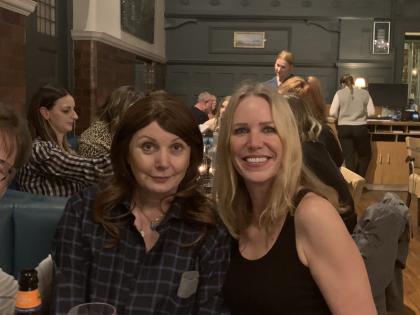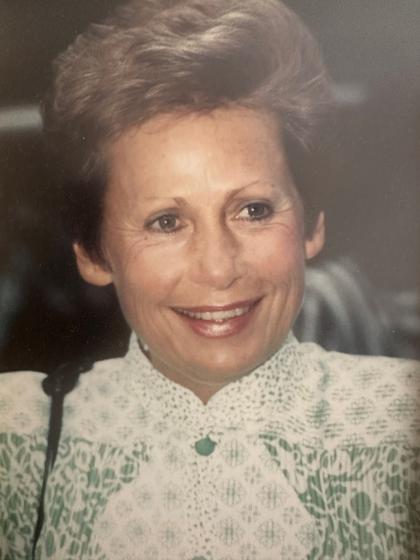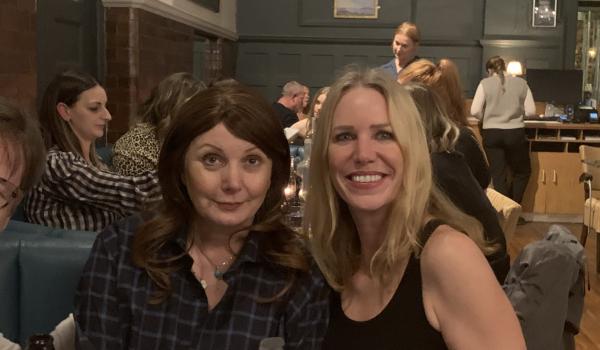She always encouraged us to do more, go out more, and not let the days pass us by.
It was the pandemic when Ali’s friend, Jo, started to experience persistent bloating and a sharp pain in her side. Sadly, after being unable to get an appointment to see her GP, the pain became so unbearable that Jo went to A&E.
"Jo felt really let down. She begged to see a doctor but was turned away, and was told it was a musculoskeletal issue.” - Ali
Research shows that when diagnosed via A&E, women are almost twice as likely to have advanced ovarian cancer compared to women diagnosed following a GP referral.
Ali not only has lost her friend to ovarian cancer, but also her aunt. She has become more determined to raise awareness of the disease and encourage women to understand what’s normal for them.
Ovarian cancer is sneaky. It mimics other diseases and conditions, making it difficult to diagnose but it's stolen the lives of my friend, and my aunt.” - Ali
Ali's not alone in her determination to drive change for those diagnosed with ovarian cancer. Through awareness and a focus on GP education we know that improvements in early diagnosis can be made.

Diagnosing as early as possible, when the cancer is easier to treat
Jo was diagnosed with stage 4 ovarian cancer. The bloating and abdominal pain were two symptoms of the disease that weren’t considered when Jo tried to seek help. She died three years after diagnosis following intensive surgery and chemotherapy.
Her experience is one we hear all too often, yet we know that if diagnosed early, 9 in 10 women will survive, which is why awareness of the symptoms and GP education is vital.
Dr Sharon Tate, Head of Primary Care Engagement at Target Ovarian Cancer said:
A GP plays such an important role in recognising the symptoms and improving outcomes by having ovarian cancer diagnosed or ruled out. We know that with the right access to training, we can improve diagnosis.
There are a number of barriers to early diagnosis which, as an organisation, we're targeting through our GP education programmes and professional networks.
Ovarian cancer does not discriminate
One common misconception we hear all too often is women being told they are too young to have ovarian cancer.
"The two people I know closely with ovarian cancer were both in their early 50s. It’s dangerous to think that this is an older woman’s disease. Women shouldn’t be dismissed on the basis of age.” - Ali
Ovarian cancer can occur at any age but is most common in the over 50s. Ovarian cancer does not discriminate – and knowing the symptoms to be aware of, what tests to ask for, and your family history can assist with early diagnosis.
Ali said:
My Aunt Carol had recently completed treatment for breast cancer when they discovered an ovarian cyst was cancerous. She was a very stoic person, but this was the only time my mum saw her younger sister cry. At the time, in 1996, they told Carol that it was highly unusual to have both breast and ovarian cancer but what we know now is that they can be linked. Because of this, I have yearly CA125 blood tests, so we can see progress is being made but it can still go further.

Awareness must go further
During her three years of cancer treatment, Jo was passionate about raising awareness of ovarian cancer.
"She couldn’t understand why the colour teal wasn’t everywhere. For a disease so stealthy, she really believed everyone should be talking about it, which was why she was always openly discussing how she was, and what she was experiencing. She never shied away from it." - Ali
Ali has joined the Target Ovarian Cancer Campaigners network to increase awareness and demand action from the government.
We all need to be talking about our ovaries, and our health. We need to know what’s normal for us so that we know what is new and when to be concerned. Having a voice through organisations like Target Ovarian Cancer we get spread the word and help women to be diagnosed at the earliest stage." - Ali
Find out how you can get involved with campaigning
If you’ve been affected by this story and would like to speak to a specialist nurse, you can call our dedicated support line on 020 7923 5475 or contact us: [email protected]. We're open from 9am until 5pm, Monday to Friday.
If reading this story has helped you, join the Ovarian Cancer Community to connect with more people affected by ovarian cancer: www.targetovariancancer.org.uk/onlinecommunity



